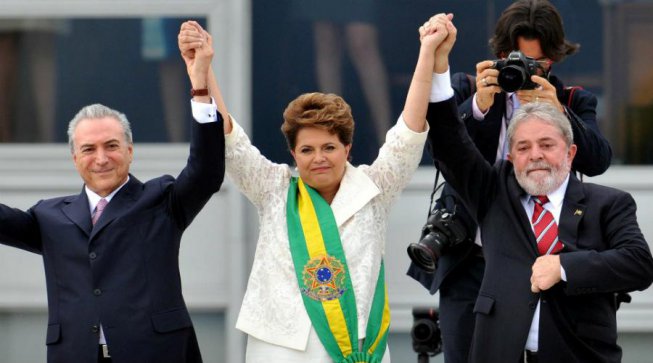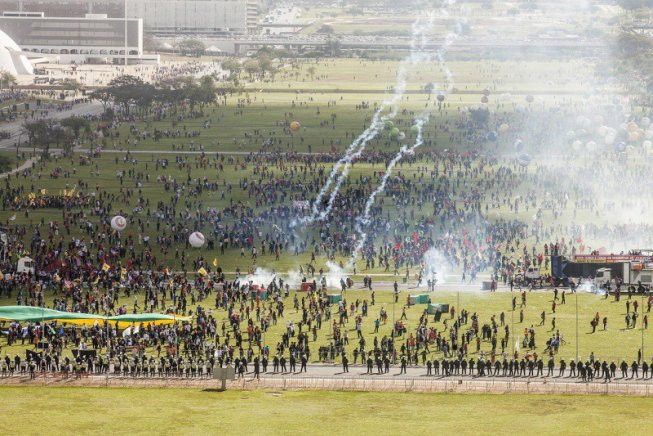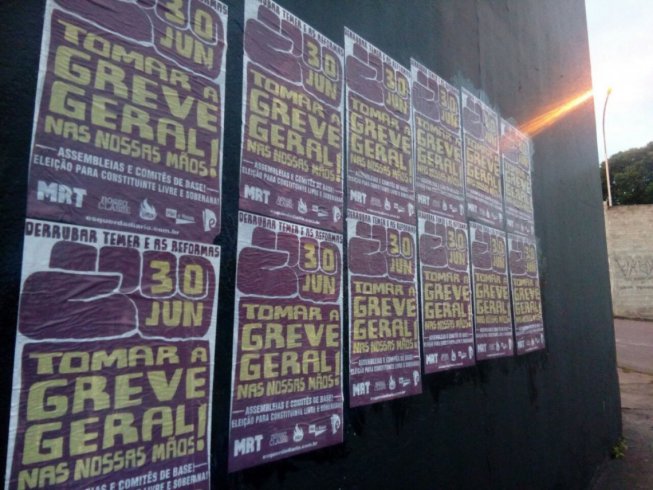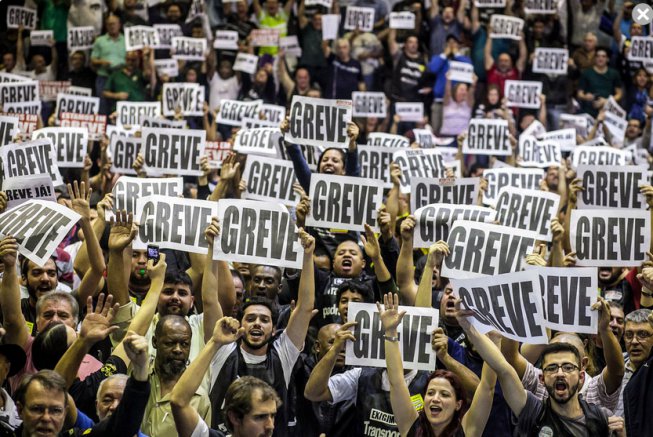On Friday, June 30, Brazilian workers will bring the country to a standstill in protest against the federal government’s labor and pension reforms. Work stoppages, roadblocks, pickets and demonstrations have been planned in all major cities. This takes place in a political context of complete instability– Michel Temer’s presidency is in jeopardy as he is the first president to be charged with corruption. His allies are deserting him and as his approval ratings are in the single digits. At the same time, Brazil’s economic crisis continues– a crisis that has not been averted by austerity measures. Public employees sometimes go months without being paid their salary, adding to huge public discontent.
Despite a labor bureaucracy eager to negotiate away workers’ rights, the general strike will go on as announced over a month ago. While the Workers’ Party (PT) and its allies in the national trade union centers try to channel mass discontentment into a campaign for the next election cycle, strike action such as this offers an independent strategy for the working class that has the potential to defeat reforms imposed President Temer.
How did we get here?
Roughly two years ago a political crisis erupted in Brazil as the country entered a deep economic recession, investigations into corruption in the federal government turned to scandal, and infighting broke out within the Dilma administration. Lula’s and Dilma’s trademark developmentalist economic policies were scrapped in favor of hardline austerity as conservatives and the press called for even deeper spending cuts and more market-oriented reforms. A part of the judicial branch then emerged as a new political force tied to multinational corporations that wielded the power to shatter the career of what seemed to be any political figure in the country. Operation Car Wash put the judiciary branch on the map as a major political player, able to investigate and arrest members of Congress. Despite mass corruption in all other political parties, the judicial branch, as well as right wing TV station Globo News targeted the PT alone. In this context of uncertainty, corruption and scandal, a fragile coalition was formed around the Brazilian Democratic Movement Party headed by then-vice president Michel Temer and in April 2016 President Dilma was impeached.
What followed was a barrage of attacks on the working class, the most egregious of which were the freezing of education and healthcare budgets, a gutting of labor rights legislation, and a pension reform that will effectively deny retirement pensions to millions of Brazilians.
Since Temer took power over one year ago in the institutional coup, his approval ratings have plummeted, leaving him at 7%. Instead of altering his policies to reflect the interests of the Brazilian public, Temer has used his extreme unpopularity to claim that he is uniquely positioned to organize the austerity measures that Brazil needs. However, his Presidency has been on the verge of collapse for months, particularly after a recording in which he encourages bribery emerged. This led to corruption charges against Temer just this past week. It is yet another stage in the saga that is Brazilian politics– which has not only been compared to House of Cards, but is said to be more corrupt and dramatic than the TV show.
Tá difícil competir.
— House of Cards (@HouseofCards) May 17, 2017
“It is getting difficult to complete”– from Brazil’s House of Cards twitter.
Temer’s Crisis
The Brazilian capitalist class is in a deep crisis, particularly now as the Judicial Branch, a former ally of the Temer administration begins to turn on him. Temer’s government is more and more unviable after losing any remnant of support from the population, as well as from many of the sectors who supported the coup. At the same time, right wing forces in the country have been strengthened and, on the other side, the working class has begun to mobilize using working class methods– the strike and the general strike.
In this context, if Temer is ousted on corruption charges, there may be indirect elections: the Congress will choose a new President. This may curb the political polarization in the country and bring back some remnant of stability, or could further deepen the government’s crisis of legitimacy. The Brazilian left, as a whole, calls for new general elections, in which the population will choose a new President, which would likely elect former President Lula based on poll numbers.
Public discontentment and various attempts to capitalize on Temer’s unpopularity have grown steadily on the left and the right. A byproduct of the radicalized right-wing opposition to Dilma has been the growing support enjoyed by the hate-mongering congressman, former army captain and probable presidential candidate Jair Bolsonaro. On the other side of the aisle, former president Lula, who will once again be eligible for reelection in 2018, has emerged as the leading candidate, with support from trade unions and the centrist left.
Workers’ rights are now constantly under threat by the government’s reforms. Rather than fighting against these reforms, labor bureaucrats see the way forward to be Lula’s reelection, even though Lula may be unable to undo these austerity measure (even if he wanted to). In fact, the Workers’ Party (PT) began implementing austerity measures and privatizing Brazilian industry before the coup. The PT made the electoral coalition with Michel Temer, who would eventually oust President Dilma. Thus, the PT is not a real alternative to the right wing and to austerity.

Coup President Michel Temer with PT’s Dilma and Lula. This photo was taken when Dilma was elected President and Temer Vice President.
What is the Workers’ Party?
Himself a former union leader, Lula rose to prominence in the historic metalworkers’ strikes of 1979 and 1980 in which labor effectively posed a challenge to the military dictatorship. A wave of strike action swept the country. Elements of radical self-organization emerged and the regime was pushed against the wall. As president of a local union, Lula was tasked with undermining the radical political potential of the strike by dividing the growing movement and restricting democratic self-organization within the unions. Rather than openly fighting the dictatorial regime, Lula sought to bargain with it. This strategy of reformist class conciliation became the cornerstone of his then-newly-founded Workers’ Party.
Despite the PT’s opposition to the severe neoliberal policies of Brazil’s first civilian administrations and their notorious Washington Consensus agenda, Lula followed in the footsteps of the predecessors when he was President, making alliances with capital, as well as with the Brazilian right wing. PT economic policy featured typical pro-business measures to stimulate investment like market deregulation, lowered interest rates, massive tax incentives, and policies designed to boost domestic consumption. During the Lula and Dilma administrations, the process of the wholesale privatization of public services and assets continued, subcontracting surged, rural land monopolization and speculation decimated native Brazilian peoples; meanwhile Brazilian capitalists saw historic profits.
However, Lula also famously provided a minimal safety net of Brazil’s poor– it is not uncommon to hear Brazilians say that because of Lula, they have meat on the table. Under Lula, many families had access to credit for the first time, resulting in a spending boom and huge profits for the capitalists and new products for the Brazilian working class. Lula left the Presidency loved by the majority of Brazilians, and his successor, Dilma, was left to respond to the emerging economic crisis with austerity measures.
Lula hopes to capitalize on this support from the Brazilian working class in order to win the 2018 Presidency. The PT still has a firm grasp on the Brazilian labor leadership through Brazil’s largest labor union, the CUT. Through the union bureaucracy, the PT seeks to control the working class– making sure it doesn’t go too far or organize too independently in the fight against austerity. Yet, as Temer implements more and more cuts, the Brazilian working class demands that the labor unions put up a fight.
The Largest General Strike in Recent Brazilian History
On April 28, the Brazilian working class was part of the largest general strike in decades. Public transportation workers went on strike throughout all of the major capital cities in the country. Members of the industrial sector, as well as teachers and other groups of workers engaged in a work stoppage to protest Temer and his reforms — particularly his attacks against workers’ rights and pensions.

Massive protest in Brasilia.
This huge general strike was followed by a protest of over 100,000 people in Brasilia on May 24. This protest resulted in a face-off between the workers and the police, who injured dozens of people, even shooting a worker. Temer even summoned the military to repress the protest. After immense pressure from workers, the unions decided to call a general strike after the massive Brasilia protests. But, the strike was called for nearly a month later, making sure the energy of the mobilization petered out.
This desire to fight and the ability to go further than the interests of the union bureaucrats tied to the PT will be tested on June 30. Some unions that are more directly tied to the bosses have explicitly boycotted the call to strike. They openly reject the general strike and instead, want to negotiate the austerity measures with the government. Their only concern is maintaining automatic dues checkoff, which line the pockets of bureaucrats who haven’t worked in years. Other unions that are closer to the PT, like the CUT, give lip service to supporting the strike, but have not organized assemblies– a basic step in organizing workers. They have not mobilized the rank and file to make June 30 an active and fighting strike.
We of the Revolutionary Workers’ Movement (MRT) and the Pão e Rosas (Bread and Roses) women’s movement are promoting a nation-wide mass campaign to encourage workers to continue expanding mobilization, without relying on union bureaucrats to organize the general strike on June 30 or future struggles. Through the Esquerda Diário of the Left Voice international network, thousands of pamphlets have been distributed and posters have been put up in various cities and states, calling for the formation of factory committees and democratic assemblies to organize in this national struggle.

Take the general strike in our hands!
We have to mobilize to topple Temer, but having new elections is not enough– we have to change the rules of the game, not just the players. The Brazilian working class is capable of bringing the country to a halt, toppling Temer and his reforms, and advancing the political structure against the regime by imposing, through the class struggle, a free and sovereign constituent assembly. We can thereby revoke the reforms and put an end to Brazil’s corrupt congress controlled by business interests whose impunity is secured by the judiciary.










